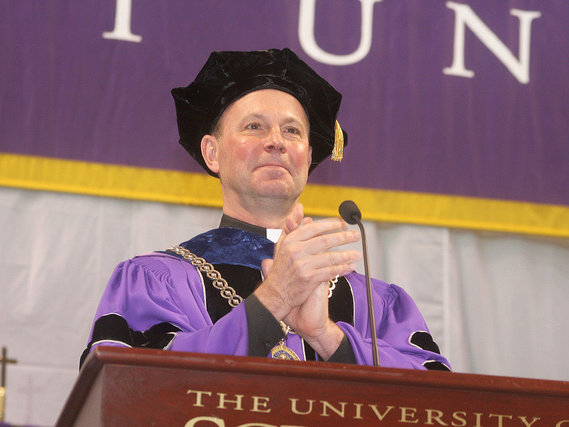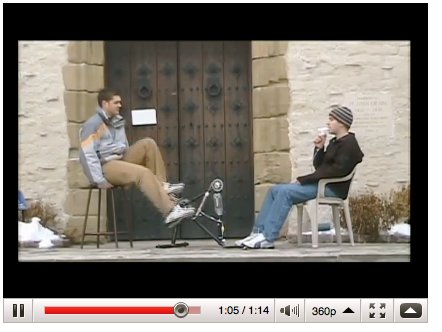Marquette women's basketball coach Terri Mitchell, 44, began her sixteenth season at the helm of the Golden Eagles with one milestone just behind her and another just ahead. Entering the season, she had amassed 296 wins, one more than legendary men's coach Al McGuire had while at Marquette. On Nov. 29, by routing New Orleans University 96-35, she became the first basketball coach in school history to win 300 games.
Mitchell came to Milwaukee in 1990, one year after graduating from Duquesne University, and after one season as a graduate assistant at Arizona State. She spent five years at Marquette as an assistant coach before getting the top job in 1996.
This week, OnMilwaukee.com sat down with Mitchell to talk about what her passions are away from basketball, how she takes a motherly approach to her players, and why this was the most difficult Super Bowl for her to watch ever.
OnMilwaukee.com: Congratulations on 300 wins!
Terri Mitchell: Thank you!
OMC: What does that mean to you?
TM: It means I've been here a while (laughs). I set out way back when, and saw how many wins Al McGuire had (295 at Marquette) so it was pretty significant for me to pass him because he's such a legend. But more than anything else it reminds me of all the great players and staff members. Its also longevity and commitment to a place. There were a lot of opportunities to leave, but I really felt like Marquette gave me a chance. They took a chance on me, an assistant, and I've tried to do my best to give back to them.
OMC: You are originally from Harrisburg, but went to college in Pittsburgh. A lot of transplants from there say that Milwaukee reminds them of home. Is that true?
TM: Oh, yes, absolutely. Both cities are working class. Both are beautiful cities; you are surrounded by water. In Pittsburgh it's the three rivers, here it's the lake. Both cities come alive in the summer. People care; people in both cities take pride in where they are from. Both cities' focus is on their professional sports teams in winter. Here it's the Packers, and we have a football team you may have heard of in Pittsburgh (laughs).
OMC: Well speaking of that, you're a Steelers fan living in Packers country. How difficult was it watching the Super Bowl?
TM: Extremely! (laughs) I was the only Steelers fan in the house! It was tough, but I really do love the Packers. I appreciate great football; I watch them all the time. I appreciate that they are about business. I appreciate that you don't read very much about them off the field. They don't do all of those antics that some other teams do. For me, as a coach, that's what I'm about. I see Pittsburgh that way too, and that's why I've been a Steelers fan for so many years. As for the Packers, there is only one time I wasn't rooting for them, and I lost. I'm still hearing about it.
OMC: Do you consider yourself a Milwaukeean yet?
TM: Well, almost half of my life has been here. Twenty-one years, so I'm almost there. But now when I refer to home I refer to Milwaukee.
OMC: Everyone who knows you mentions how much faith plays a role in your life. Where does that come from?
TM: My life was a little scattered as a child, there were things going on in my family life, and I attached to faith. I just found a comfort that God was looking after me, and that he cared about me and that relationship became primary. That was something that was very private; that wasn't something that I was out shouting to the world. It was just me and God, hanging out, helping me through things. I decided back then at 13 that this would be the most important thing in my life. I've made a lot of mistakes between 13 and 44, but I've always know who is for me. I've always had a lot of security in that.
OMC: Away from basketball, you have been involved in prison ministry. What have you learned through that?
TM: Yes, I met a woman named Linda Strong in Bible study and just hit it off. She and her husband have a prison ministry. I never thought I would go to prison because that wasn't my bent. She invited me to come one time and I did, and it was a surreal kind of thing. You look at these women, and obviously they did horrible things and hurt other people. They know that, it's not an excuse, but they see hope in God. You are in there and talking to them and they are so hungry. I look at people that are free and not in prison; they have choices to make and they're not locked up for the rest of their life, and they never choose God. Meanwhile, you have these people that are behind bars and they just want to make their life right. Their life is, you get up, you have a schedule, you eat, and still they are having joy every day. They've learned about forgiveness, they've learned that they hurt people and what that's done. We found some common ground where there wasn't a lot of common ground. It made me realize the essence of people.
OMC: You also went to Rwanda?
TM: Yeah. I met some people at a retreat and told them that if they ever go to Africa, I want to go. So we went. I don't see myself as a missionary, but I see myself doing short-term trips with people I know so I can connect with them and help.
OMC: What did you find when you got there?
TM: Hugs and smiles are international. With the kids, I would get down on my knees, smile with my arms out and they would come running. And then they would want to play. We would just play tag. You don't need to know language to play tag. I would just touch one of the kids and then run. They would all then gather around me and start running, and I wanted to scoop them all up and take them home of course. Your heart is just so drawn.
OMC: You also recently coached a game barefoot. How was that?
TM: It was a little cold! (laughs) That was for the organization called 'Soles for Jesus.' It was to raise awareness for the need for shoes in Ethiopia. The funny thing is that when I decided to do it, I realized that we were playing at the Bradley Center that day and said to myself, 'there's ice under that floor!' But you know what, after the ball went up, I forgot I was coaching in bare feet. I did get my toenails painted beforehand though because everyone would be looking at my feet.
OMC: As it relates to your players, has there been an instance where off the court someone has had a profound impact on you because of something they were going though?
TM: When Erin Monfre's mom passed away, that's something I'll never forget. The journey with a player as her parent passes away from cancer was really impactful. When Efueko (Osagie-Landry) got pregnant that was one of biggest impacts that I'll never forget, because when her mom dropped her off from Oklahoma, she said 'I won't be able to get here much, take care of my daughter.' I've never had kids of my own; I've always looked at my players as my family. It's more than just coaching a team. It's looking after and taking care of people. So when Efueko came in to tell me she was pregnant, it was natural for me to not worry about her place on the team, but to make sure that she graduates and that her child is taken care of. When she came back for her fifth year, we had little Moriah with us the whole year. That season we were ranked in the top twenty-five, and I'm holding Moriah at practice rocking her. Then I'm handing her off to one of my assistants because it's not like she decided to sleep during practice. To watch my whole staff step up and watch Moriah when Efueko had to go to class, that impacted me because that's what family is all about. Families aren't perfect. Families have 'stuff.' The essence of family is how you respond.
OMC: Have you thought about what you want to do after you are done coaching, whenever that may be?
TM: My bent is towards people I know right now in non-profits that I know, so I think I would get more involved with that. I think that when sports are over it's over. I don't see myself going over to the administration side or broadcasting or any of those things. It's been a great part of my life and it's taught me a lot of lessons, and I would take that into the greater picture of church life, whatever that may be. I don't know what that means right now, but I figure God does. In the meantime, I'm going to give my heart and soul to Marquette and to these players.
Doug Russell has been covering Milwaukee and Wisconsin sports for over 20 years on radio, television, magazines, and now at OnMilwaukee.com.
Over the course of his career, the Edward R. Murrow Award winner and Emmy nominee has covered the Packers in Super Bowls XXXI, XXXII and XLV, traveled to Pasadena with the Badgers for Rose Bowls, been to the Final Four with Marquette, and saw first-hand the entire Brewers playoff runs in 2008 and 2011. Doug has also covered The Masters, several PGA Championships, MLB All-Star Games, and Kentucky Derbys; the Davis Cup, the U.S. Open, and the Sugar Bowl, along with NCAA football and basketball conference championships, and for that matter just about anything else that involves a field (or court, or rink) of play.
Doug was a sports reporter and host at WTMJ-AM radio from 1996-2000, before taking his radio skills to national syndication at Sporting News Radio from 2000-2007. From 2007-2011, he hosted his own morning radio sports show back here in Milwaukee, before returning to the national scene at Yahoo! Sports Radio last July. Doug's written work has also been featured in The Sporting News, Milwaukee Magazine, Inside Wisconsin Sports, and Brewers GameDay.
Doug and his wife, Erika, split their time between their residences in Pewaukee and Houston, TX.







